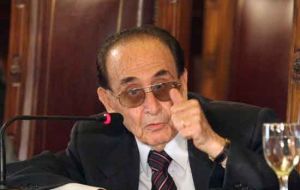MercoPress. South Atlantic News Agency
Argentine High Court reluctant to be involved in central bank reserves dispute
 Judge Carlos Fayt said the issue is “essentially political” and should be solved by Congress
Judge Carlos Fayt said the issue is “essentially political” and should be solved by Congress A member of the Argentine Supreme Court suggested that the high court may reject a government appeal that could open the way for the government of President Cristina Fernandez de Kirchner to pay debts with Central bank reserves.
Judge Carlos Fayt quoted in the Buenos Aires media said the Supreme Court may reject the government’s appeal against a federal appeals court ruling that put a (necessity and urgency) presidential decree on hold referred to bank reserves, stressing the issue is “essentially political” and should be resolved by Congress.
In a TV interview with the cable news channel C5N, Fayt added that the Supreme Court “in principle does not consider preliminary injunctions. The Court only analyzes cases that are brought before it through extraordinary measures. We have nothing to do with preliminary injunctions that are, let's say are occasional“.
Fayt added that the analysis of the matter ”will take some time“ and asked about the government's desire to settle the issue as soon as possible he stressed that ”this is not a problem for us.“
Last Saturday, Interior Minister Florencio Randazzo said that ”it will be important“ that the Court allows the Executive to use the Central Bank reserves without waiting for Congress to ratify or reject Mrs. Kirchner's decree.
Fayt also remarked that the debate regarding the 6.57-billion-dollar fund in Central Bank reserves to pay public debts ”is essentially political and that's the job of Congress.“
Earlier in the week Fayt told journalists the justices will have to ”deeply analyze“ the government's writ requesting the Court to revoke the ruling of the Federal Administrative Appeals Court, which put on hold the President's decree.
He also commented that ”all seven members of the Court have to ponder over it. You only think right when you meditate on the issues for a long time.“
The remarks seem to indicate that the Court believes lawmakers, not the justices, must settle the controversy triggered by Mrs. Cristina Kirchner's decree. Actually, the government is trying to arm-twist governors to have the support of the senators it needs to achieve a majority in the Upper House: 37 votes.
The Executive is planning to have the presidential decree debated on March 3, after the 2010 period of ordinary sessions begins.
Also Justice Raúl Zaffaroni recently criticized politicians ”who are incapable of solving the problems and resort to the courts more often,“ adding that ”this wears out both the courts and politics.“
Last week the Argentine Supreme Court chose not to tackle the core issues related to the President's decree when it rejected an injunction requested by San Luis province against the use of Central Bank reserves to pay debts.
Without saying whether the Executive was entitled to take such a step - portrayed by the opposition as ”unconstitutional“ - the Court dismissed the case arguing that San Luis does not have a ”direct interest” in the matter.




Top Comments
Disclaimer & comment rulesCommenting for this story is now closed.
If you have a Facebook account, become a fan and comment on our Facebook Page!